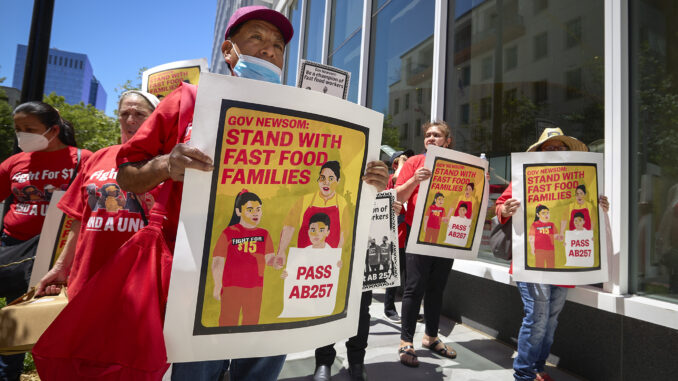
Headed to Gov. Gavin Newsom’s desk are two highly controversial labor-backed bills that could test the limits of the governor’s commitment to progressive policy as he seeks to elevate his national profile and appeal to voters in other states.
Among the pile of bills that state lawmakers greenlighted in marathon Monday floor sessions as they race to conclude the year’s legislative business ahead of a Wednesday deadline: a proposal to create a first-in-the-nation state council to regulate wages and working conditions in the fast food industry and another to make it easier for farmworkers to vote in union elections.
Newsom hasn’t taken an official position on the fast food council bill, which is ardently supported by many labor unions and just as strongly opposed by business, restaurant and franchise groups — even after it was significantly amended to address some of their concerns, CalMatters’ Jeanne Kuang reports.
And Newsom’s own administration seems to have articulated different stances on the state’s role in workplace regulation:
- On the one hand, the state Department of Finance announced its opposition to the fast food council bill in a June analysis, citing “significant ongoing costs” for the Department of Industrial Relations and “a fragmented regulatory and legal environment for employers” that could “raise long-term costs across industries” and “exacerbate existing delays” in enforcing wage theft violations and other labor laws.
- On the other hand, Newsom’s Future of Work Commission in 2021 released a report that found California needs to form a “new social compact for work and workers” by setting “moonshot goals,” including raising wages, helping workers form unions and increasing the number of quality jobs — defined as those with a living wage, stable and predictable pay, safe and dignified workplace conditions, and access to benefits, among other factors.
But for many progressive Democrats, the bill comes down to letting “fast food workers … literally sit at the table with their bosses and talk about the challenges of their job,” as California Labor Federation leader Lorena Gonzalez — who authored a prior version of the proposal as a state Assemblymember — said at a Monday rally celebrating the bill’s passage.
For worker advocates, that logic also underlies a bill that would make it easier for farmworkers to unionize. As Jeanne explains, the proposal would give farmworkers the option to vote by mail in union elections, instead of the current system where in-person elections are required and typically take place on the grower’s property.
Proponents say the bill is necessary since farmworker union representation in California has dwindled down to statistically zeroand because a U.S. Supreme Court decision last year effectively kicked labor organizers off farms.
But a spokesperson for Newsom, who vetoed a similar version of the mail-ballot bill last year, said as recently as Sunday the governor remains opposed despite the adoption of some amendments that he supports. The governor “cannot support an untested mail-in election process that lacks critical provisions to protect the integrity of the election,” said spokesperson Erin Mellon. The Senate GOP caucus urged Newsom to veto the bill, saying it was “fraught with opportunities for trickery.”
- Assemblymember Mark Stone, the Santa Cruz Democrat who authored the bill, said Monday: “I’m hoping the governor, even though we have some disagreement on a few parts of this, will see his way to signing it.”
Farmworkers and their supporters, who just wrapped up a 355-mile march to Sacramento to urge Newsom to sign the bill, are taking things up a notch: According to the United Farm Workers Foundation, they plan to hold daily 24-hour vigils in Sacramento, Los Angeles, San Francisco and Fresno until Newsom decides the bill’s fate.



Be the first to comment